Gorath (1962)
Directed by: Ishirô Honda
Written by: Jôjirô Okami, Takeshi Kimura
Starring: Akira Kubo, Kumi Mizuno, Ryô Ikebe, Yumi Shirakawa
HCF REWIND NO.116. GORATH AKA BIJO TO YOSIE GORASU, MYSTERIOUS STAR GORATH [Japan 1962]
AVAILABLE ON DVD
RUNNING TIME: 88 min/ 78 min [US version]
REVIEWED BY: Dr Lenera, Official HCF Critic
1980.The JX-1 Hayabusa spaceship, originally sent to collect data on Saturn, has its course diverted to investigate the mysterious star Gorath, which looks like it may get dangerously close to Earth. The JX-1 reaches locates Gorath and discovers that it’s much smaller than the Earth but with 6000 times the gravity. The JX-1 transmits back the data about the star but gets sucked into the star’s gravitational field which drags the ship into Gorath, incinerating it. Japan and the rest of the world are stunned by the discovery and, after some reluctance, send up the JX-2 Ootori spaceship for a voyage to investigate Gorath. Meanwhile The United Nations band together to discover a solution to the problem, and decide that rather than try to destroy Gorath, it would be easier to move Earth out of its way…….
If you’re not an expert on these Japanese Toho Studios science-fiction films that I am reviewing, than Gorath may be the film you have least likely heard of, and even if you have heard of it, I doubt you will have seen it. It’s no surprise it has never been available for home viewing in the UK; not many of the non-Godzilla films were, but nor has it received an official DVD or Blu-Ray release in the US. Unless you import from outside the US or UK [something I highly recommend as films are often cheaper too], you will have probably only seen Gorath, if you’ve seen it at all, on US video and of course not only in a pretty bad print but in its inferior ‘Americanised’ version. This film has been treated like shit, a great shame considering the rubbish that does get released, and also because director Ishiro Honda said that, amongst all the amazing films he made, from Godzilla to Mothra to Battle In Outer Space, it was his favourite. You cannot imagine how excited Yours Truly was as he put his recently delivered Japanese subtitled DVD into his DVD player and pressed Play. A pretty awesome watch it turned out to be too, a very tense and mostly intelligent science-fiction epic which seems to have been inspired by, but betters, When Worlds Collide, and, for all its obscurity, I wonder if films as different as Armegeddon and Sunshine were inspired a bit by it?
As with Honda’s previous science-fiction spectacles The Mysterians and Battle In Outer Space, Gorath begun life as a short story from the pen of Jijiro Okami. The screenplay was written by Takeshi Kimura. Kimura was usually given the more serious, downbeat and adult films to script, while the other major writer for these movies Shinichi Sekizawa usually did the lighter, happier and more ‘juvenile’ projects. Honda and Kimura even researched certain things to see if they were possible, such as the idea of physically moving Earth by having atomic energy channelled through huge pipes which would fire all at once, the atomic force shifting the planet. Made with great care and clearly quite a personal film for Honda, Gorath was sadly a commercial disappointment, even when producer Tomoyuki Tanaka decided late in the day to add a monster to the story. The digging around in the South Pole would now let loose a giant walrus. Maguma only appeared for around five minutes and was cut from the US version when preview audiences laughed at it. It didn’t come out properly in the States till 1968,when Brenco Pictures released it in a double bill with Honda’s The Human Vapour. By then, the days when major studios handled Toho pictures were long gone.
Gorath has such a great opening that for quite a while after the film suffers a little. The sequence of Captain Sonoda’s spaceship nearing Gorath and eventually getting destroyed is a superb combination of technical brilliance, nail-biting tension and human emotion. When Sonada tells his crew that they are actually on a mission which they have no chance of surviving, the scene almost damn near had me in tears, and this was barely five minutes into the thing. A veteran actor who would appear in some other Toho movies, Jun Tazaki delivers the speech with superbly understated emotion, his face registering what he is really thinking until, unseen by his crew, a solitary tear runs down his face. Kan Ishii’s ominous chords patterns music helps build the suspense as they near the actually rather scary-looking Gorath, a red and yellow mass that is not at all a living creature but almost seems like some horrid alien mass the way its yellow flares emit like tentacles.
So no surprise then that the film now dips for a bit, and there’s even more than the usual ‘debating what to do’, though this time the whole world seems to be involved. Despite all their action, many of Honda’s films actually reveal their director to be a pacifist. He naively believed Godzilla would bring about an end of atomic bomb usage, and later films like Gorath seem to be in part a plea for world peace and co-operation. Interestingly there’s more romantic stuff than usual, with both the film’s heroes shown as being involved in relationships. Tatsuo has an odd moment where he chastises his girlfriend for still mourning her fiancée and then throws her picture of him out of the window. The characters do generally seem ‘real’ and around half way through we get back into the action again anyway. The brief Maguma scene is a little pointless and more than that the monster looks hastily constructed. A dialogue scene debating what to do with it seems to have been hastily added too, but there’s more spaceship excitement and an incredible sequence of Tokyo being flooded with water which is one of Eiji Tsuburaya’s best special effects and ends with a really eerie shot of the city underwater. We also get to see Saturn’s rings and the Moon fall victim to Gorath, though in the end there are less thrills than you might expect [the Earth doesn’t even destroy Gorath, it just gets out of its way], but then the whole film has a very mature, sober feel.
Maguma notwithstanding, the care given to the production is striking, even meticulously getting the details inside the UN building right.The wirework and matting is often barely noticeable and sometimes not noticeable at all. The lengthy construction of the South Pole base has probably the best miniatures in Tsuburaya’s career, and even though in reality it would have taken far longer to do all this work than the film suggests, you really do think you are watching a base in the snow being made. It’s very similar to a scene in Things To Come but more elaborate. Gorath also features probably Hajimi Koizumi’s best camerawork with a large number of impressive tracking shots and the odd striking close-up, such as when Tatsuo, who has had amnesia, regains his memory, his face filling the screen. Honda and Koizumi sometimes shows more ambition than usual such as a [actually rather pointless] sequence where astronauts are singing a song and we have some very disorientating aerial shots of what they are seeing, the camera very jittery. Honda perfectly balances the aspects of the story he is telling and, while in the end I don’t think Gorath is quite the masterpiece it is reputed by some to be, it’s easy to tell he loved this particular project.
Modest, thoughtful Ryo Ikebe [from Battle In Outer Space] and enthusiastic, initially-immature Akia Kubo [who would go on to some more Toho science-fiction films] are a very likeable pair of heroes, though Ikebe inspires so much confidence that we have little fear that his elaborate plan to save the Earth will fail. Gorath was the first of several of these movies to feature the absolutely gorgeous Kumi Mizuno, who Honda said was his favourite leading lady. She played more assertive, and even sexual [her first scene here has her taking off her top, while later on she has a bath] roles than was common for the time and genre. Kan Ishii’s deadly serious score ramps up the excitement at the right moments. It emphasises rhythmic patterns and melodic fragments rather than actually melody, though one oft-used ‘action’ motif sounds in its first half almost the same as Akira Ifukube’s Godzilla theme. Intentional? Who knows. Not as frightening as Godzilla, as exhilarating as Battle In Outer Space or as magical as Mothra, Gorath is nonetheless another fine film from Honda and Toho, gripping, mature and quite thought-provoking. It cries out for a DVD/Blu-Ray release outside of Japan.
The ten minutes shorter US version isn’t great, though certainly not the worst. They possibly did a good thing in removing Maguma, but they did it stupidly so that, for some reason, people are shooting at a landslide! By contrast, they repeated shots of Gorath so it is in the film more. The other cuts are minor though they re-edited a large number of scenes for some reason, the only possible improvement being having the Moon destroyed near the end. Pointless additions include a theramin-like sound whenever Gorath appears, and other sound effects here and there. You can just about get a sense of the original movie watching the US edit, which is more than one can say for some.

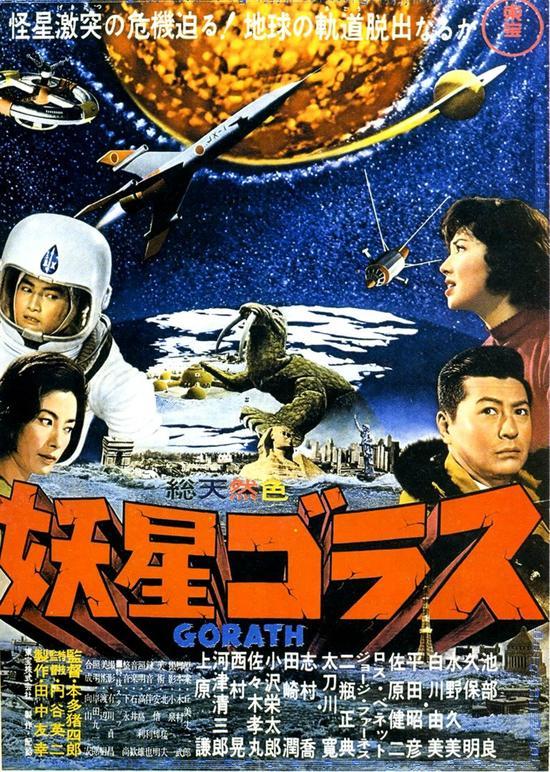
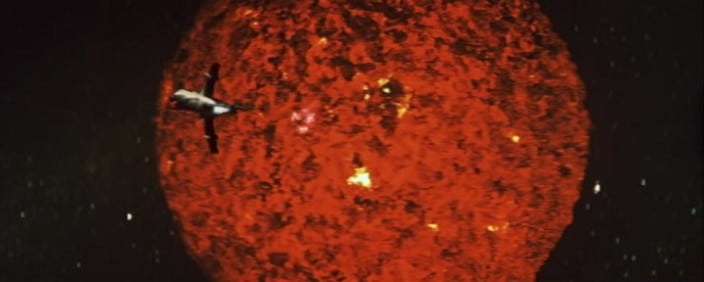
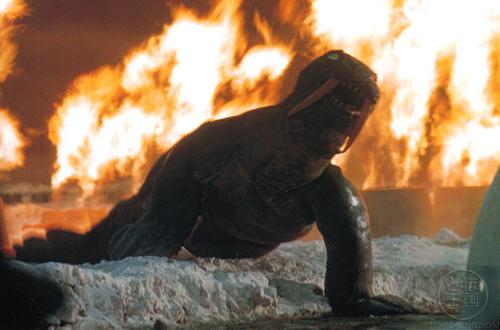


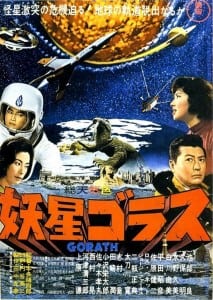

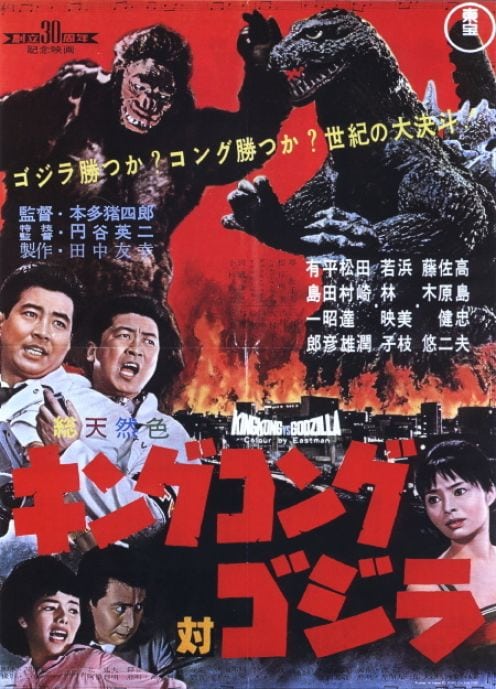
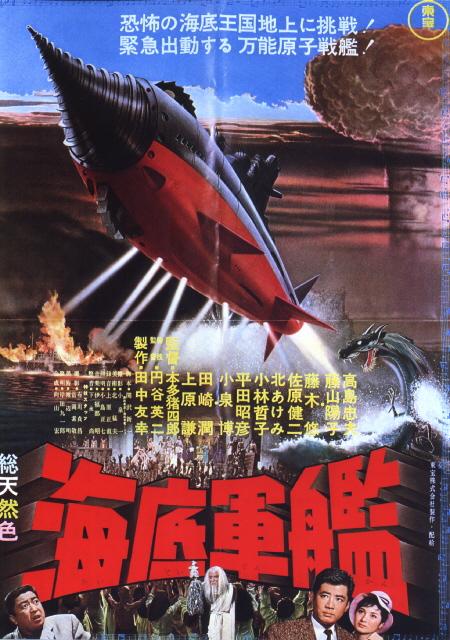
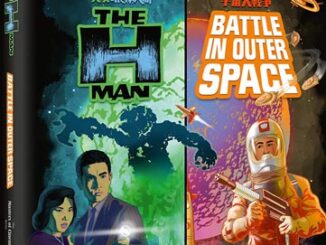
Be the first to comment